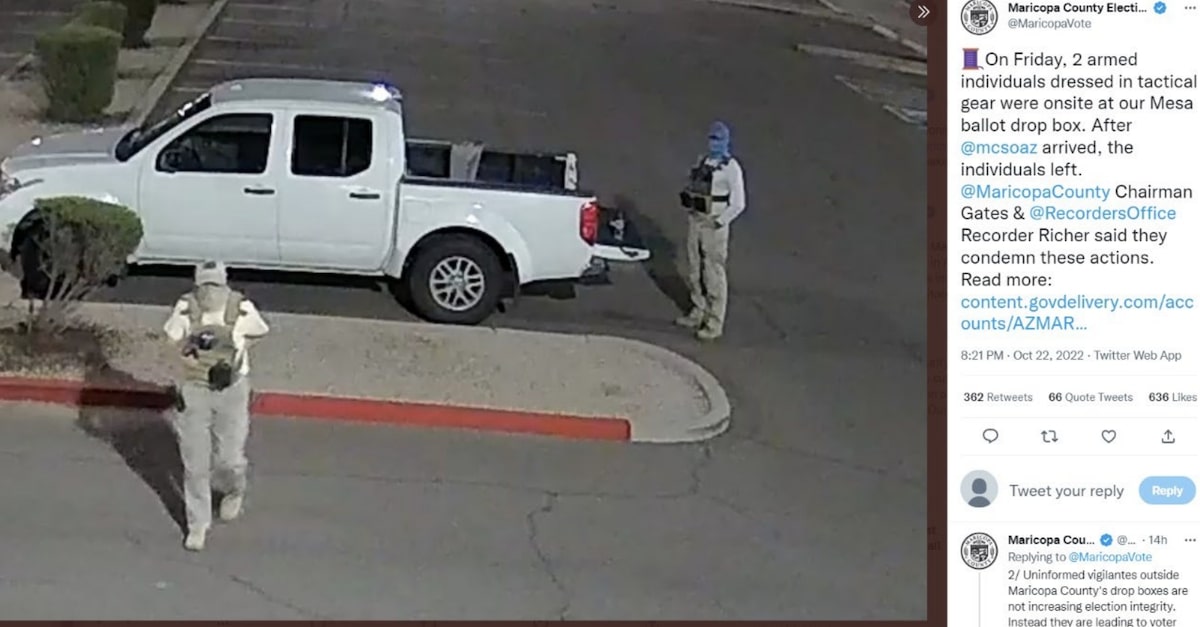
Two armed vigilantes dressed in tactical gear watch a drop box site in this photograph disseminated by the Maricopa County Elections Department. (Photo via complaint)
In a defeat for advocacy groups raising the alarm about “vigilantes” in Arizona, a federal judge on Friday refused to issue a temporary restraining order blocking people from recording voters or gathering near drop boxes in the Grand Canyon State.
“While there are serious questions implicated, the Court cannot provide preliminary injunctive relief without infringing core constitutional rights,” wrote U.S. District Judge Michael T. Liburdi, a Donald Trump appointee.
“Further, while the irreparable harm factor tips in favor of Plaintiffs, the balance of the equities and public interest do not,” Liburdi continued. “A preliminary injunction cannot issue on these facts, but Arizona Alliance is invited to return to this Court with any new evidence that Defendants have engaged in unlawful voter intimidation.”
The ruling, a temporary measure until the court can fully adjudicate the matter, falls two days after the judge held a hearing in a lawsuit filed by the non-profit groups Arizona Alliance for Retired Americans and Voto Latino. They had sued an entity going by the name Clean Elections USA, its founder Melody Jennings, and unidentified “vigilantes” on the hunt for so-called “ballot mules.” That conspiracy theory of voter fraud comes from right-wing academic Dinesh D’Souza’s debunked film 2000 Mules, which argued a wide-ranging scheme to deliver fraudulent ballots to drop boxes.
In making its argument, the film purported to show a map of Georgia that was actually the city of Moscow, Russia. Former Attorney General Bill Barr laughed out loud before describing the holes in D’Souza’s false claim that cell phone data showed large-scale voter fraud against former President Donald Trump.
A hearing held earlier this week in the case featured testimony by four witnesses, who testified about the sense of fear felt by Arizona voters, particularly seniors and people with disabilities whose mobility issues drop boxes were designed to accommodate.
“I am trying not to be intimidated to speak out and be worried about someone coming to my home,” Saundra Cole, the president of the Arizona Alliance for Retired Americans, told the court on Wednesday.
A 41-year-old mother named Jenea Phillips explained why she filed a police report and then another to Arizona’s Secretary of State Katie Hobbs (D) after a man appeared to be filming her as she cast her ballot.
Phillips said she feared the person who taped her would “dox” her, as she claimed these groups threatened.
But the judge found that the plaintiffs did not prove the threat against her or others.
“Plaintiffs have not provided the Court with any evidence that Defendants’ conduct constitutes a true threat,” the ruling states. “On this record, Defendants have not made any statements threatening to commit acts of unlawful violence to a particular individual or group of individuals. There is no evidence that Defendants have publicly posted any voter’s names, home addresses, occupations, or other personal information.”
For Judge Liburdi, the case pit two important safeguards against each other — the right to vote and the First Amendment’s protections of free association.
“The parties implicate rights equally crucial to the functioning of our Republic, and the public has a strong interest in maintaining them,” the 14-page ruling states. “Thus, the Court finds that the balance of the equities and the public interest factors is neutral.”
He also rejected injunctive relief based on alleged violations of the Ku Klux Klan Act, a Reconstruction-era law punishing conspiracies against civil rights. It was designed, in part, to stop white supremacist groups from infringed upon the rights of previously enslaved Black people.
“As noted above, Plaintiffs must show proof that the purpose or intent of Defendants’ conspiracy was to intimidate or threaten voters from engaging in lawful activity related to voting in federal elections,” the ruling states. “But Plaintiffs have not provided the Court with evidence that Defendants intend to prevent lawful voting. Rather, Defendants stridently maintain that they seek to prevent what they perceive to be widespread illegal voting and ballot harvesting. For these reasons, the Court finds that Plaintiffs are unlikely to succeed on the merits and that there is no serious question going to the merits of Plaintiffs’ Klan Act claim.”
Liburdi invited the plaintiffs to pursue relief again if they find more evidence of intimidation. Attorney David Robert Fox, who represents the plaintiffs, did not immediately respond to Law&Crime’s email requesting comment. He is the member of the firm founded by Marc Elias, the Democratic Party lawyer who supported states across the country battling Trump and his allies’ efforts to overturn the election results.
The plaintiffs quickly filed a notice of appeal following the ruling.